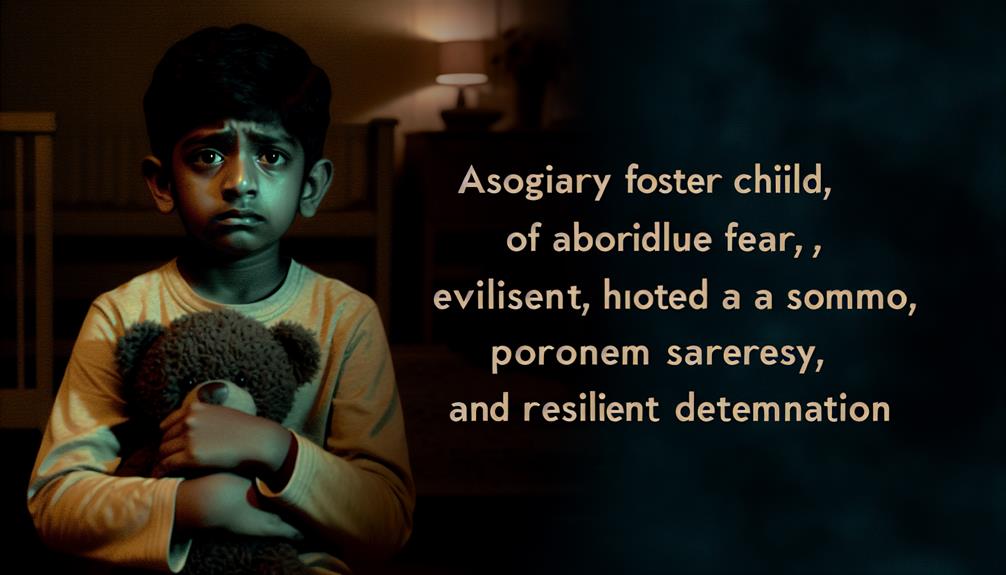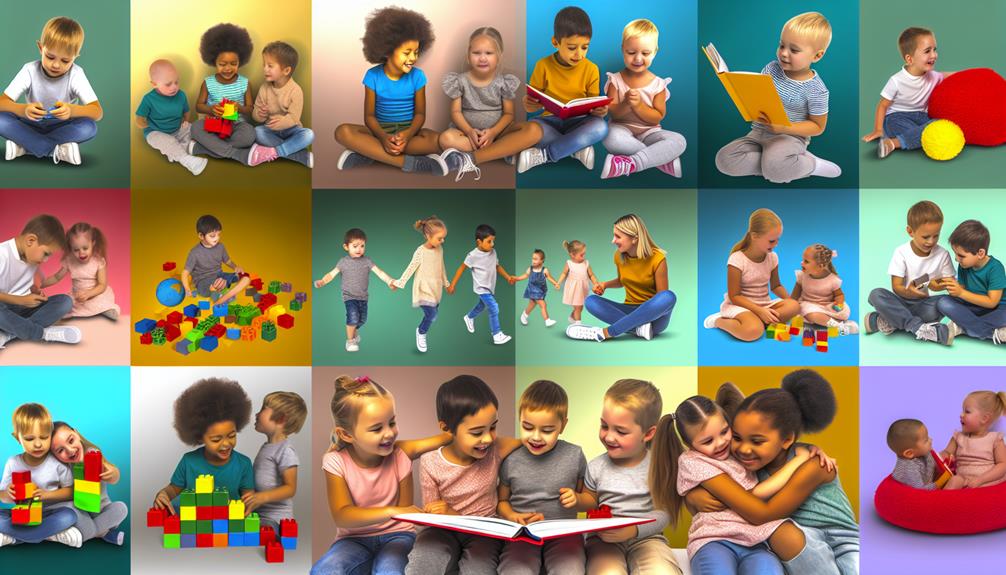Foster children's lives are laden with emotional ups and downs, challenges, and resilience. Initially, they grapple with emotional turmoil and fear due to new environments and circumstances. Health concerns, educational hardships, and social adjustments add to their ordeal. Dealing with complex attachments and building trust is critical, yet difficult. However, they also experience remarkable resilience, possibly grown in this tough environment. Foster care offers them emotional healing, educational support, and mentorship. Can you imagine the triumphant feeling overcoming such challenges brings? Continue on this journey to discover how it shapes their social interactions, emotional intelligence, and future life course.
Key Takeaways
- Foster children often endure emotional turmoil and uncertainty, which can lead to fear, separation anxiety, and difficulties in understanding their situation.
- Adapting to a new environment, cultural differences, and unfamiliar dietary habits can pose significant challenges for foster children.
- Building trusting relationships is crucial to foster children's emotional growth, requiring understanding, consistency, empathy, and active listening from caregivers.
- Foster children face unique educational experiences, often needing special educational support and mentorship to bridge past circumstances and future opportunities.
- Despite the challenges, foster care offers opportunities for emotional growth, resilience development, and enhanced educational support, fostering empathy and emotional intelligence in children.
Understanding UK Foster Care System

Let's explore the complex operations of the UK foster care system, a crucial lifeline for children who, often through no fault of their own, find themselves in need of temporary or long-term care and support. Legal complexities abound in this system, each crafted to guarantee the child's welfare is prioritised. With a myriad of laws and regulations, the system aims to secure the best possible arrangement for each child. Remember, it's not about fitting a child into a system but shaping the system around the child.
Navigating these legal complexities can be challenging, but essential caregiver support is available. These supports offer training and resources to help you understand the child's needs and how to meet them. They also provide a network of experienced foster carers who can share their insights and experiences.
The foster care system in the UK isn't perfect, but it's continuously evolving, aiming to improve the lives of the children it serves. While the legal intricacies may seem challenging, the caregiver support available is robust and designed to empower you to be the lifeline these children need. So, investigate further, learn more, and become an instrumental part of this transformative journey.
Entering the Foster Care Journey
Starting your journey into foster care can be an emotional whirlwind; it's not unusual to feel lost and overwhelmed. Adjusting to a new environment takes time, patience, and a lot of courage.
Initial Emotional Turmoil
Upon entering the foster care journey, you may encounter an initial wave of emotional turmoil, a common experience for many foster children. This turmoil often stems from the trauma associated with being removed from your original home. It's a challenging period, but with trauma coping techniques and emotional resilience, you can navigate through it.
Let's consider the following elements that contribute to this initial emotional turmoil:
- Uncertainty: The unknown can be frightening, especially when it involves a new home and family.
- Separation Anxiety: Being away from your family, irrespective of the circumstances, can cause emotional distress.
- Confusion: Understanding why you're in foster care can be difficult.
- Fear of Rejection: The worry about not being accepted by your foster family can be overwhelming.
Understanding these feelings is the first step towards building resilience and coping with trauma.
Adjusting to New Environment
Traversing through the labyrinth of change, you'll find that adjusting to a new environment is an essential part of the foster care journey, filled with its own unique challenges and triumphs. This transformation demands a cultural adaptation that can be demanding, as you grapple with new norms, values, and ways of life.
It's not just the shift in social settings, but also health concerns that require attention. You may encounter unfamiliar dietary habits, environmental allergens, or even stress-related health issues. But remember, this is a journey of resilience. With each step, you're expanding your worldview, fortifying your resilience, and learning to thrive in new territories.
As you navigate these challenges, take heart in the triumphs that come with overcoming them.
Building Trusting Relationships
As you adjust to this new environment, building trusting relationships becomes an important aspect of your journey into foster care. It's essential to understand that your attachment styles may influence these relationships.
Here are the steps you can take:
- Understand your attachment style: This can help you identify potential communication barriers and ways to overcome them.
- Be open and consistent: This builds trust and shows you're reliable.
- Show empathy: Understand and validate the feelings of others. This can help build stronger connections.
- Practice active listening: This shows you value the other person's thoughts and feelings.
Challenges Faced by Foster Children
Moving through life, foster children often encounter distinctive and intimidating challenges that can greatly influence their personal growth and development. Among these hurdles, two stand out: healthcare access and legal representation.
You'll find that healthcare access is a major concern. Foster children, often grappling with complex medical needs due to early life trauma or neglect, may struggle to obtain necessary care. The bureaucratic labyrinth of the healthcare system, coupled with the transient nature of foster care, often impedes consistent, quality medical attention. You must understand, these children often move between placements, causing disruptions in their medical continuity.
Legal representation is another hurdle. Foster children's rights and interests can be overlooked in court procedures, leading to decisions that may not fully consider their wellbeing. Without proper legal representation, these children can't effectively voice their views, wishes, or needs. This absence of advocacy can have detrimental impacts, potentially hindering their future prospects.
As you navigate the complexities of these challenges, remember, these aren't mere obstacles. They're significant factors shaping the lives of foster children, often dictating their future trajectories. Empathize with their struggles, analyze their circumstances, and endeavor to improve their experiences.
Emotional Impact on Foster Children

Beyond these tangible hurdles, it's important to acknowledge the profound emotional impact foster care has on children. Childhood trauma can lead to deep-seated emotional issues. These may manifest as anxiety, depression, or even behavioral disorders.
As you navigate understanding this impact, consider these key points:
- Childhood Trauma: Foster children often come from backgrounds of neglect or abuse. This trauma can negatively affect their emotional development and mental health.
- Critical Care: The transient nature of foster care can exacerbate emotional distress. They may struggle with attachment issues, feeling safe, and trusting others.
- Therapeutic Interventions: These are essential for helping foster children manage their emotions. Techniques such as cognitive-behavioral therapy, play therapy, and trauma-focused interventions can be beneficial.
- Resilience and Support: Foster children can demonstrate remarkable resilience. With the right support, they can heal and thrive emotionally.
Understanding the emotional impact of foster care is a stepping stone to providing the right support. As you gain mastery in this area, you'll be better equipped to help foster children navigate their emotional journey and work towards a more positive future.
Educational Experiences of Foster Children
Traversing the educational system can be a challenging journey for foster children, given their often-disruptive life circumstances. They may require Special Needs Education, tailored to their unique circumstances and designed to provide the necessary support for their academic success.
As a mentor, understanding the complexities of their experiences is crucial. Foster youth mentorship is a critical tool in their educational journey. It often bridges the gap between their turmoil-ridden past and a future filled with potential.
The educational experiences of foster children go beyond traditional classroom learning. Their common challenges include frequent school changes, a lack of consistent academic support, and emotional difficulties, which often result in poor performance. Understanding these challenges and addressing them through targeted interventions, such as Special Needs Education and Foster Youth Mentorship, can greatly enhance their learning outcomes.
In your role as a mentor, you can provide strategic and emotional support, boosting their confidence and fostering a love for learning. Establishing a stable, supportive educational environment for these children can markedly impact their academic progression, ultimately leading to a more positive life trajectory. With appropriate support, foster children can overcome their educational hurdles and reveal their full potential.
Relationships and Social Interactions

As you guide foster children through their educational journey, don't overlook the importance of nurturing their relationships and social interactions, which play a pivotal role in their emotional well-being and overall development. The challenges they face in forming and maintaining relationships can greatly shape their self-perception and future life choices.
- Peer Influence: Foster children often struggle with fitting in, and peer influence can either hinder or foster their social growth. Positive peer connections can provide a sense of belonging, while negative influences can lead to harmful behaviors.
- Social Stigma: The stigma associated with being a foster child can lead to feelings of isolation and affect their ability to form healthy relationships. It's essential to help them navigate this stigma and build resilience.
- Building Trust: Due to past traumas, foster children may find it hard to trust others. Encouraging consistent, positive interactions can help them overcome this barrier.
- Family Connections: Maintaining relationships with biological family members, when possible, is important for their identity and stability.
Understanding these factors, you can better aid foster children in developing positive relationships and social skills, which are integral to their overall growth and success.
Positive Aspects of Foster Care
You might be wondering about the brighter side of foster care. It's not all challenges and hardships; there are indeed positive aspects to ponder.
Emotional growth opportunities and enhanced educational support are two such facets that can greatly benefit foster children, bringing about profound transformations in their lives.
Emotional Growth Opportunities
Despite the challenges often associated with foster care, it's important to recognize the unique emotional growth opportunities that this system can offer to foster children. It's a nurturing space where resilience development and therapeutic interventions are key elements.
- Resilience Development: Foster care can help children develop resilience. They learn to bounce back from adversity, enhancing their coping skills for future challenges.
- Therapeutic Interventions: Foster care often includes access to therapeutic interventions. These services support emotional healing and growth.
- Empathy Enhancement: Interacting with diverse individuals can foster empathy, fostering a sense of understanding and compassion in children.
- Emotional Intelligence: Foster children often develop emotional intelligence as they navigate complex relationships and situations.
Enhanced Educational Support
Traversing the educational system, foster children often benefit from enhanced support mechanisms designed to promote their academic success. These supports often take the form of supportive tutoring and curriculum adaptation, which can be essential in overcoming any academic challenges they face.
Supportive tutoring provides personalized guidance, assisting them to grasp concepts and build academic skills. Meanwhile, curriculum adaptation guarantees the learning materials are tailored to meet their unique needs and abilities.
Here's a glimpse of how this support looks:
| Supportive Tutoring | Curriculum Adaptation | |
|---|---|---|
| Benefits | Personalized attention | Tailored learning |
| Impact | Builds academic skills | Meets unique needs |
| Importance | Overcomes academic challenges | Promotes inclusive learning |
| Outcome | Academic success | Enhanced learning experience |
Post-Foster Care: Transitioning Into Adulthood
Coping with the shift into adulthood can be particularly challenging for foster children, often requiring them to grapple with complex emotions and life decisions without the support network typically provided by a traditional family structure. Financial independence and career guidance are two areas that demand immediate attention and can greatly influence their passage into adulthood.
Here are four key challenges and considerations:
- Budgeting and Financial Management: Without adequate financial literacy, it's easy to mishandle funds, leading to unnecessary hardships.
- Career Guidance: Career planning is vital. It's not enough to find a job; they need to strategically build a career.
- Emotional Support: It's normal to feel overwhelmed. Connecting with supportive peers or mentors can help navigate these feelings.
- Stable Housing: A stable living environment is the foundation for all other aspects of life.
It's important to understand that these aren't just 'growing pains'. These are systemic issues deeply rooted in the foster care system. By addressing these challenges, you can better equip foster youth for adulthood, thereby laying the groundwork for a more secure and fulfilling future.
Frequently Asked Questions
What Are the Health Implications of Being a Foster Child?
As a foster child, you might face medical neglect, leading to undiagnosed health issues. Additionally, your emotional wellness could suffer due to instability and trauma, potentially resulting in mental health complications down the line.
How Does the Foster Care System Differ Globally, Compared to the Uk?
You'll find global comparisons of foster care systems vastly different. Foster legislation varies from country to country. It's like comparing apples and oranges. Each system has its unique challenges and strengths.
What Role Does the Biological Family Play in a Foster Child's Life?
In a foster child's life, the biological family often plays key roles. Parental influence shapes their perspectives, while sibling relationships offer emotional support. Yet, it's complex as each situation varies greatly.
How Does Foster Care Affect a Child's Future Employment Prospects?
Foster care can present employment barriers for you. It's important to access career guidance early to overcome these challenges. With the right support, you can navigate these hurdles and secure a fulfilling future career.
Are There Any Unique Cultural or Spiritual Challenges Faced by Foster Children?
Indeed, foster children often face a cultural identity crisis and spiritual guidance disparity. They're maneuvering two worlds, their birth and foster families, which can result in confusion and a struggle to find their own identity.
Conclusion
Traversing the foster care system feels akin to sailing stormy seas. You've witnessed the challenges, the emotional waves, the educational hurdles, and the social battles these courageous children face.
Yet, amidst the turbulence, there's also the beacon of hope – the support, care, and resilience foster care can provide. As they anchor into adulthood, remember, it's not just about surviving the storm. It's about learning to dance in the rain.




